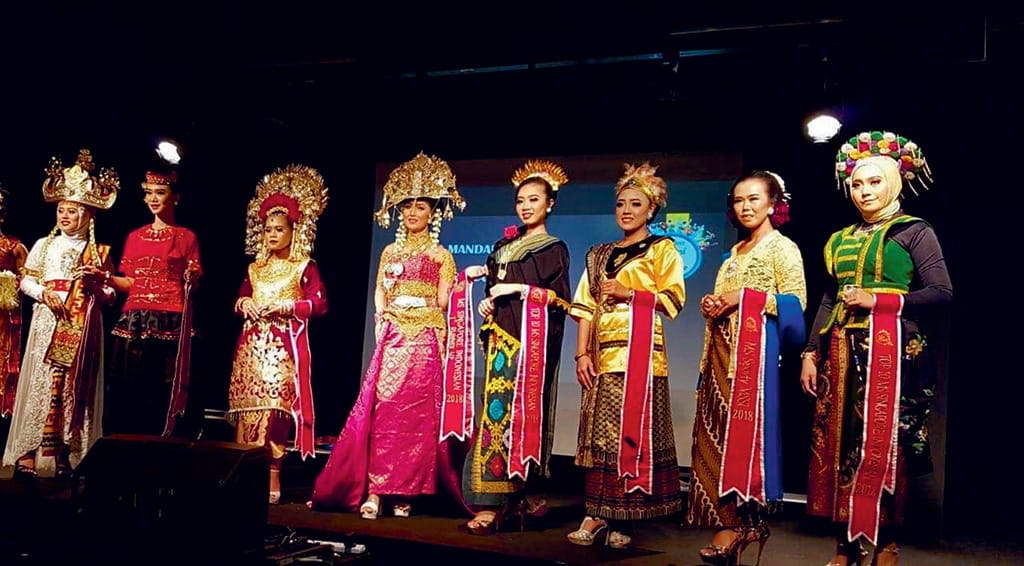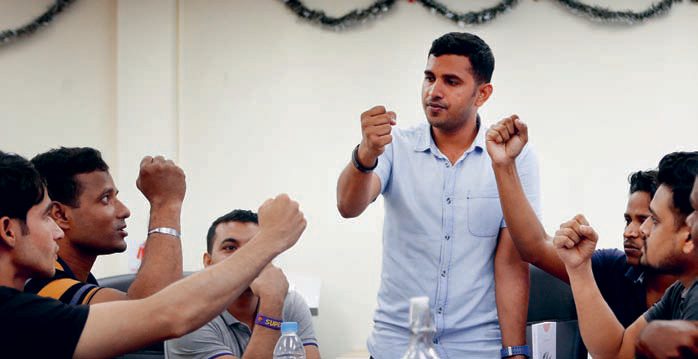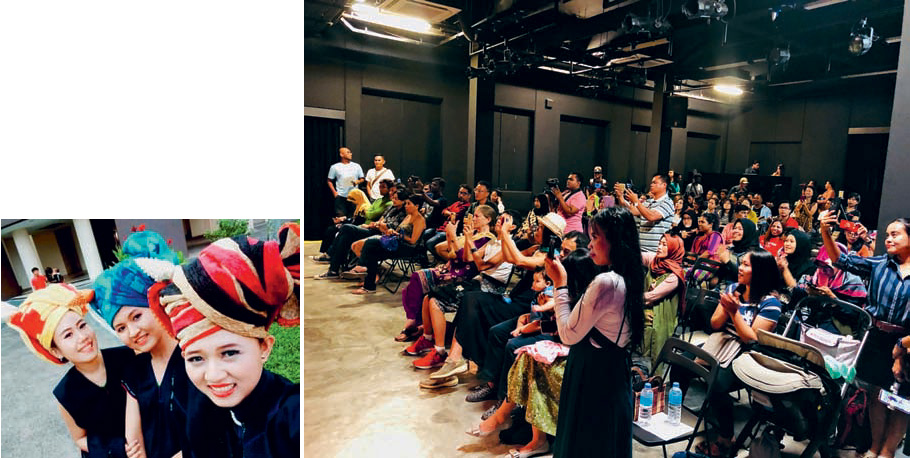Stories > In the Pursuit of Art
In the Pursuit of Art
Singaporean and Bangladeshi champions of cultural diversity come together through artistic programmes.
BY JOYCE GOH
PHOTOS THE STRAITS TIMES/SPH; MIGRANT CULTURAL SHOW SINGAPORE/FACEBOOK

A group of Indonesian workers was lauded for creating elaborate ethnic dresses for their performance using limited resources but plenty of ingenuity.
onstruction safety supervisor Fazley Elahi Rubel has a hobby that is far removed from his day job: He loves to read and write poetry. Indeed, his zest for literary pursuits led him to start a library in 2018 for his fellow Bangladeshi migrant workers – nine years after moving to Singapore for work – so they can gain access to Bengali literature away from home. But the 30-year-old Rubel had a bigger vision. He wanted to bring together diverse communities of migrant workers in Singapore by creating a platform where they could showcase their artistic talents.
“These people are not just workers,” he says of his peers hailing from his homeland, as well as India, Indonesia, and the Philippines. “They have passion and talent.”
A SINGLE PLATFORM
In the past 11 years that he has been in Singapore, Rubel says he has discovered many ground-up initiatives that engage with the migrant workers community. One of these is the annual Migrant Worker Poetry Competition organised by Singaporean Sivaji Das. Having met and befriended many participants at the event, Rubel felt inspired to start one of his own that could involve Indonesian and Filipino dancers, as well as Bangladeshi rock bands, for a multicultural talent show of sorts.
“I wanted to promote cultural bonding and friendship between different nationalities. This is a great opportunity to increase understanding between cultures and combat stereotypes,” he told local broadsheet The Straits Times in an earlier interview.
“I Never Thought The Migrant Workers Could Be So Talented In Their Artistic Pursuits, But That’s Because We Are Used To Viewing Them Through The Prism Of Their Occupation, When They Are So Much More Than That,” Says Ang Huan Ting.
With no prior knowledge of how to organise a show, however, he says he simply went along with his intuition, setting up a Facebook page to invite interested participants to register. “The friends I had made at previous editions of the Migrant Workers Poetry Competition set off a chain of new acquaintances and, soon, the word spread,” he explained.
The initiative was not without its share of challenges. “After promising to support the event, some sponsors backed out at the last minute,” recalls Rubel. Undeterred, he forked $1,000 out of his own pocket, spending the money on a rudimentary stage set-up and some promotional materials. But the biggest problem of all – the lack of a proper venue – threatened to throw a spanner in the works.
It was at this moment that he got in touch with Vincent Ng, the community lead of local cooperative A Good Space, which aims to nurture active citizenry among Singaporeans by increasing their awareness on social issues. Having learnt of Rubel’s literary initiatives for migrant workers through news reports in the local media, Ng had offered the use of a venue to host events, should the former be keen on a collaboration.
“When we first met Rubel, it was primarily to discuss the possibility of a suitable space for his show, but there are so many more ways we can work with him,” he recalls. “After all, our mission is to encourage more Singaporeans and resident foreigners to contribute towards pertinent social issues. Migrant worker rights and inclusivity are just some of them.”
Taking Ng up on his offer, Rubel requested his help. Ng then mobilised other Singaporean volunteers, including Ang Huan Ting, the co-founder of Lingua Singapura, a not-for-profit initiative that organises international language appreciation events that tie in with Singapore’s multicultural heritage. Together, they helped Rubel not just in setting up the venue but also applying for various event licences and permits that may only be filed by Singaporeans.
Thus the inaugural Migrant Workers Cultural show materialised in January 2018 at the Arya Samaj Building in Little India.

Bangladeshi Fazley Rubel (standing) launched the Migrant Cultural Show that allows diverse migrant worker communities in Singapore to come together for artistic endeavours.
Owing to the glitches along the way, Ng recalls that the event lacked structure and a proper sound system. By the time the second edition rolled around in mid-2019, however, the organisers had learnt the ropes.
There were improved publicity materials and invitations, fund-raising initiatives to cater for light refreshments and other logistical expenses, as well as proper sound and lighting equipment. Ang, too, was roped in once more to assist with the mandatory permits.
SHEDDING STEREOTYPES
The English literature teacher by profession says she has learnt a lot from working with Rubel and his friends in putting together the Migrant Cultural Show. “I never thought they could be so talented in their different artistic pursuits, but that’s because we are used to viewing them through the prism of their occupation, when they are so much more than that,” she shares. “I was particularly amazed at one of the participants, a Bangladeshi dancer. His performance cast off any preconceptions I might have had about the migrant worker community. It made me realise that we have to look beyond the surface and not judge others solely by their appearance.”
Ng agrees. “When we use the term ‘changemaker’, we tend to think of a highly educated person who comes from a certain background,” he muses. “But Rubel is a great example of the fact that anyone can be a changemaker.” He further opines that migrant workers are experts of their own lives and should be empowered. “Instead of doing things for them, why not provide them with the opportunities to be their own changemakers?” he asks.

Nang, a group formed by a trio of Myanmarese singers, was one of the participants at the event; Singaporeans and members of the international community gathered at the Aliwal Arts Centre to watch the migrant workers perform acts on stage, such as singing, dancing and poetry recitation.
A SENSE OF ACHIEVEMENT
The second edition of the Migrant Cultural Show proved to be a success. Held at the Aliwal Arts Centre, it featured more than 100 participants – who sang, danced, recited poetry and even had a rock band face-off in front of a packed house filled with both their compatriots and Singaporeans.
One member of the audience was local media entrepreneur Nomita Dhar, there to support her 34-year-old Filipina domestic helper of 15 years, Laetitia Morales, who walked away with the top prize in the beauty pageant category.
“It was heartwarming to have witnessed that Laetitia has not only been an exemplary worker, but she is also driven enough to do something to gain a personal sense of achievement,” shares Dhar, adding that she also admires the ingenuity of the other participants who, despite their limited resources, put together some eye-catching ethnic dresses for their performance.
“Singapore Gives You The Opportunities To Keep Your Passion Alive. And If You Believe In Lifelong Learning, It Is A Place That Enables And Encourages You To Do So – Regardless Of Your Background,” Says Fazley Rubel.
Indonesian domestic worker Uchie Mudjiyati was equally delighted to show off her dancing skills. “This talent show is a wonderful platform where I can share my culture with others,” the 42-year-old, who has been working in Singapore for over a decade, told The Straits Times.
Never in his wildest dreams would Rubel have imagined media coverage of the event. But amid his pride, he did not forget to thank his local friends. “Even before Vincent had confirmed the venue booking and Huan Ting had received the necessary permits, I had announced the event details on our Facebook page, because I had complete faith in them,” says the college dropout.
“I came to work here because my family had fallen on hard times,” he continues. “I have gained a lot more in life than I had thought possible. Singapore gives you the opportunities to keep your passion alive. And if you believe in lifelong learning, it is a place that enables and encourages you to do so – regardless of your background.”
